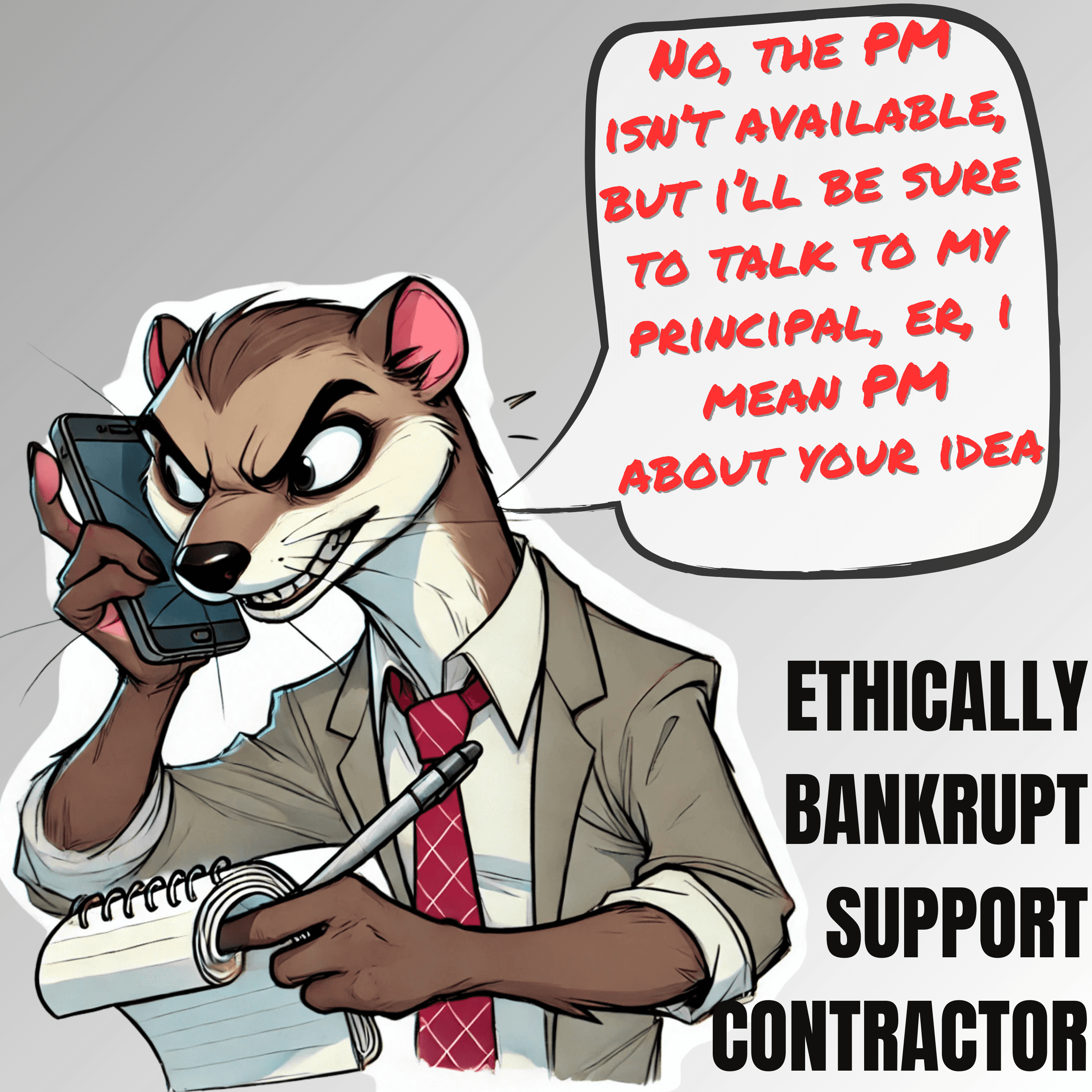Thought Piece
Sterotypes in Government Acquisition - The Dark Side
There are many (well-earned) negative sterotypes of actors in the goverment market, here are just a few
Oct 12, 2024

Federal contracting has its fair share of noble creatures—the dedicated gorillas, dolphins, and lions who work tirelessly to advance the state of defense and technology. But let’s be real: the contracting jungle also teems with more sinister, less heroic figures. These less-than-good (bad) actors might be cute, clever, or well-dressed, but don’t be fooled. Each one represents a unique hazard to anyone trying to navigate the treacherous waters of government procurement. So let’s take a look at some of the more problematic creatures, and what makes them so dangerous.

The Near-Sighted Risk-Averse Regulator Turtle
The Ultimate Obstacle to Progress
Need to get a rocket off the ground? Need to get a new radio transmitting? Need to get a new drone in the air? Need to push a new product through the ATO process? Well, meet the regulator turtle. Slow, cautious, and deeply averse to any form of risk, this creature seems to have one job: say “no.” And they’re excellent at it. Whatever you’re trying to get done, they’ll find a reason to stall it—or block it altogether.
Some classic turtle moves:
• Fear of anything new: If it hasn’t been done before, expect it to be rejected.
• Slow to act: Don’t expect quick decisions. This turtle likes to move at its own glacial pace.
• Two words: “No” and “Also no”: They love to refuse things outright, especially if it’s something new or unfamiliar.
• Mountains of paperwork: They’ll bury you in forms, regulations, and compliance checks until you’re so bogged down, you forget why you even started the process in the first place.
• Fear of change: Anything that deviates from established procedures is seen as a potential disaster in the making.
Watch out: Turtles won’t just slow you down; they’ll stop you in your tracks. You’ll spend hours (or months) jumping through hoops, and if you don’t play by their rules, you’ll find yourself at a dead end.

The Rent-Seeking Consultant Vampire Bat
The Shadowy Middleman With a Fee for Everything
Swooping into your project under the cover of darkness, the Bat offers you “guidance” through the bureaucratic maze of federal contracting. But much like a vampire, the Bat doesn’t give without taking. They’ll charge exorbitant fees for “helping” you secure contracts, but at the end of the day, you’re often left wondering what value they actually provided.
Common Bat behaviors:
• Exorbitant fees: They’ll charge you for every minute of their time, even if all they did was repeat things you already knew.
• No actual expertise: They’ll act like they have insider knowledge, but their advice is often vague or entirely unhelpful.
• Disappears post-contract: Once they’ve taken their cut, don’t expect to hear from them again—unless there’s more money to be made.
Watch out: Rent-seeking consultants will drain your resources without providing any meaningful assistance. They’re experts at swooping in when there’s money on the table and vanishing just as quickly once they’ve taken their share.

The GovCon Software Maker Beaver
The Master of “Compliance,” Not Innovation
These beavers are hard at work—no, not innovating—but building software systems that look and feel like they were made in 2002. “Hey, it’s compliant!” they’ll shout, proudly showing off an interface that could have come from Windows XP. Don’t expect cutting-edge design or intuitive user experiences here; they’re not aiming for building a moat through user loyalty and delight. They’re aiming for building a barrier to entry dam of regulatory compliance and endless checkboxes that only they can check.
Some of their classic moves:
• Outdated UX: If you were nostalgic for clunky, decade-old software, you’re in luck. “Compliance” is their excuse for not keeping up with the times.
• Reluctance to change: Don’t bother suggesting modern updates. “We’ve always done it this way” is their mantra.
• Bare-minimum effort: They’ll give you exactly what’s required to pass an audit—and not a line of code more.
Watch out: While the beaver might seem like a diligent worker, they’re more interested in meeting minimum specs than delivering anything user-friendly. Don’t expect innovation, and definitely don’t expect anything fast.

The Ethically Bankrupt Support Contractor Weasel
The Gatekeeper Who Steals Your Ideas While Blocking Access
Meet the Weasel, the slippery, two-faced support contractor who makes it their mission to block you from ever getting close to the Acquisition Program Manager (PM) they supposedly support. Hiding behind their role as the PM’s “right-hand,” they expertly funnel your ideas back to their own company’s executives, ensuring their team steals your concepts and claims credit for your work.
The Weasel doesn’t just protect the PM’s calendar—they’re actively working against you, passing off your innovations as their own while making sure you’re stuck outside, banging on a door that never opens.
Key Weasel tactics include:
• Stonewalling and gatekeeping: Every time you try to meet the PM, the Weasel has an excuse ready: “The PM isn’t available,” “We’ll need to reschedule,” or “I’ll pass along your ideas for you.” Spoiler alert: they won’t.
• Idea theft: While you’re blocked from pitching directly to the PM, the Weasel is running back to their company, feeding them every idea you’ve shared. Before you know it, their company is presenting your innovations as their next big thing.
• Pretending to help: The Weasel will assure you that they’re doing everything they can to get you in front of decision-makers, all while keeping you at arm’s length and taking full advantage of the information you’ve naively shared.
Watch out: The Weasel is a master of manipulation, acting like they’re there to support you when, in reality, they’re siphoning off your hard work to benefit their own company. By the time you realize what’s happening, your ideas are already being pitched to the PM—by the Weasel’s team, not yours. Don’t let this cunning operator lock you out of your own opportunity while they cash in on your creativity.

The Ethically Bankrupt System Integrator Cuckoo Bird
The Contract Parasite That Pushes You Out of Your Own Nest
Ah, the cuckoo bird. At first glance, it seems like the perfect partner—swooping in to “help” you secure that big contract, offering their expertise in navigating the complexities of federal procurement. But don’t be fooled. The moment they land in your project nest, they begin their slow and subtle takeover. Before you know it, the work share you thought was yours is now theirs, and you’re left watching helplessly as they edge you out, replacing your contributions with their own “eggs.”
Here’s what to watch for when a cuckoo bird lands on your contract:
• “Here to help”: Initially, they’ll present themselves as indispensable facilitators, taking on the heavy lifting of contract administration and integration.
• Stealthy takeover: Like the cuckoo pushing eggs out of a nest, they’ll slowly cut down your share of the work, inserting their own team into the critical roles while making your contributions seem less important.
• Out of the picture: By the time you realize what’s happening, you’ve been entirely pushed out of your own project. The Cuckoo Bird has taken over, feeding off the profits while you’re left empty-handed.
Watch out: The Cuckoo Bird excels at making you feel like part of the family, only to systematically edge you out. Their methodical takeover starts slow, but before you know it, you’re out of the nest you built, and they’re comfortably perched on your hard-earned contract. Stay vigilant, or you’ll be left wondering how you got replaced in your own project.

The “Free” Advisor Chihuahua
The Overly Enthusiastic Guide to Nowhere
Meet the “Free” Advisor Chihuahua, the chipper little helper from federally and locally subsidized programs. They’re here to provide “free” advice and assistance, but let’s be honest—it’s mostly fluff. While they promise to help you navigate the labyrinth of government contracting, they rarely offer anything beyond surface-level guidance. By the time you’ve wrapped up with them, you’re no closer to winning work, but you are perfectly teed up for the Rent-Seeking Consultant Bat to swoop in and take advantage of you.
Key Chihuahua behaviors:
• Lots of energy, little substance: They’ll tell you all about SAM.gov, SBA certifications, and the basics of federal contracting. What they won’t do is help you actually get a contract.
• Low-value advice: Sure, they’ll help you set up your profile and point you to some online resources, but their advice is so generic and basic that it leaves you wondering why you didn’t just Google it yourself.
• Setting you up for failure: Instead of guiding you through the complexities of government contracting, they leave you dangling, making you an easy target for more predatory consultants—like the Rent-Seeking Bat—who promise real help (for a hefty fee).
Watch out: The Chihuahua’s “help” is free for a reason—it’s hardly help at all. Their cheery advice might get you through the door, but it won’t get you the contract. By the time you realize how little you’ve gained, you’re already in the crosshairs of more aggressive, fee-hungry players who are ready to profit off your confusion. The Chihuahua may not bite, but they’ll leave you vulnerable to those who do.

The Well-Meaning Tech Scout Spaniel
The Enthusiast With No Real Influence
The Spaniel is a lovable character, wide-eyed and eager to discuss how much they “love your technology.” They’ll gush about how innovative your product is, and how excited they are to include you in their innovation exercise, experimentation event, or trip report. The problem? Their enthusiasm doesn’t translate to any real influence. Sure, they’ll name-drop you in meetings, but don’t expect any contracts to follow.
Some typical Spaniel traits:
• Genuine excitement: They’ll fawn over your technology, acting like they’ve discovered the next big thing.
• Limited follow-through: They’ll promise to “include you in the report,” but what happens after that? Crickets.
• Endless enthusiasm, zero results: You’ll feel good about the conversation, but don’t hold your breath waiting for anything concrete to come from it.
Watch out: While the Spaniel means well, they’re not the decision-maker you need. You’ll end up chasing their praise while missing out on actual opportunities. They’ll make you feel like you’re on the right track, but in reality, you’re just chasing your tail.

The Ethically Bankrupt Subcontractor Snake
The Smooth Talker With Zero Ethics
Ah, the snake. Slithering into your project with promises of “partnership” and “collaboration,” this creature has one goal: to take over your customers. What starts as a friendly subcontractor relationship quickly morphs into a hostile takeover of your client base. Before you know it, your clients are theirs, and your business? Well, it’s not looking so great anymore.
Some telltale signs of a snake in your midst:
• “Your customers are our customers, right?” They’ll use smooth, inclusive language to blur the lines between what’s yours and what’s theirs.
• Backdoor deals: They won’t hesitate to approach your clients directly, sometimes without your knowledge, and offer them a “better” deal.
• Zero loyalty: The moment things go south, they’ll slither away, leaving you to clean up the mess.
Watch out: Snakes are experts in manipulation, and they’ll charm you right out of your business if you’re not careful. Keep a close eye on them, or you’ll find yourself without a leg to stand on—literally.

The Opinionated End-User Bull
The Forceful Operator Who Thinks They Can Solve It All, with Force
Charging into every conversation like, well, a bull in a china shop, the Opinionated End-User Bull is tired of bureaucratic delays and has zero patience for the system. In their mind, bureaucrats are useless, and they’re the only one capable of solving the problem—never mind that their “solutions” often miss critical regulatory or technical details.
While their frustration may be valid, their approach is often destructive. Instead of collaborating with stakeholders, they bulldoze their way through the process, leaving broken dishes (and relationships) in their wake.
Typical Bull behaviors include:
• Impatience with process: If it takes more than five minutes, it’s already too slow. They’ll bulldoze past regulations, oversight, and collaboration, convinced they can just “solve this myself.”
• Disdain for bureaucracy: They openly mock the rules and procedures of acquisition, seeing them as obstacles instead of necessary safeguards. And if a system doesn’t work exactly how they want it, they’ll be the first to toss it aside.
• One-size-fits-all or niche solutions: In their rush to get things done, Bulls often apply band-aid fixes or try to buy technologies without considering long-term sustainment, larger system integration, or supply chains. As a result, their “quick solutions” can create bigger problems down the road, for themselves and the "bureaucrats" they despise but nonetheless rely upon.
Watch out: While the Bull might seem like a breath of fresh air in a sea of bureaucracy, their reckless approach can end up doing more harm than good. Their “I’ll fix it myself” mentality often means bypassing crucial steps, resulting in broken systems or worse—broken trust with the people they’re supposed to work with.

The Well-Meaning Tech Startup Kitten
The Techie Who Doesn’t Know What They Don’t Know
We’ve all met them. Bright-eyed, bushy-tailed, and overflowing with enthusiasm, these kittens come bounding into the contracting space, tablet in one paw and an ill-defined product in the other. They’re here to “save the DIB” (that’s the Defense Industrial Base, but they probably don’t know that yet), with no idea what they’re getting into.
Some key features of these over-eager creatures:
• Buzzwords galore: “AI”, “disruptive innovation”, and “blockchain for logistics” are their favorites, though they struggle to explain what any of these mean in the real world.
• Optimism without a plan: They’ll tell you they can solve every problem but haven’t quite nailed down what the problem is, or what “compliance” entails.
• Unrealistic timelines: Expect them to promise delivery by next quarter… if they can figure out how to navigate SAM.gov.
Watch out: These kittens might be cute, but they’ll waste your time. They mean well, but without knowing the rules of the jungle, they’re just stumbling around, and you’ll end up guiding them more than they guide you.

The FOMO Venture Capitalist Squirrel
The Excited Investor Who’s Afraid of Missing the Next Big Thing
Related to the lovable kitten, enter the FOMO Venture Capitalist Squirrel, darting from one shiny new government project to the next, always on the lookout for the latest “game-changer.” With their Starbucks in hand and Patagonia vest zipped up tight, they’ll talk about being “bullish” on the market—but don’t expect them to provide any real insight into why. They’re not interested in understanding the details—they just don’t want to miss out.
For them, every project is a potential goldmine, even if they haven’t quite figured out what the project does yet. Their decision-making is driven more by buzzwords and fear of being left out than any real understanding of the space.
Squirrel tendencies include:
• Lack of a Clear Investing Thesis: They’ll say things like, “I’m really bullish on the government market, but when asked simple questions like "why" or "are you in this for the 48 months it takes to get a new product sold" or "do know that govcon companies don't go public", they’ll just sip their coffee and shrug.
• Fear of missing out: They’ll jump into any opportunity that seems remotely promising, without doing their homework. The moment they hear about a new tech or buzzword, they’re scrambling to throw money at it.
• Short attention span: Once they’re in, they’re already looking for the next shiny object. Don’t expect long-term commitment or follow-through; they’re too busy chasing the next potential unicorn.
Watch out: The Squirrel will happily invest in your project, but their involvement is often superficial at best. They’re here because of hype, not because they understand your product. And the moment something flashier comes along, they’ll be gone, leaving you to pick up the pieces. Don’t let their excitement fool you—if they don’t know why they’re bullish, you might not want them on your team.